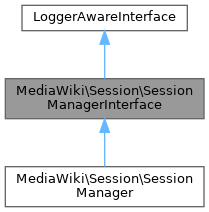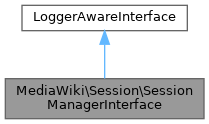This exists to make IDEs happy, so they don't see the internal-but-required-to-be-public methods on SessionManager. More...


Public Member Functions | |
| getEmptySession (WebRequest $request=null) | |
| Create a new, empty session. | |
| getSessionById ( $id, $create=false, WebRequest $request=null) | |
| Fetch a session by ID. | |
| getSessionForRequest (WebRequest $request) | |
| Fetch the session for a request (or a new empty session if none is attached to it) | |
| getVaryCookies () | |
| Return the list of cookies that need varying on. | |
| getVaryHeaders () | |
| Return the HTTP headers that need varying on. | |
| invalidateSessionsForUser (User $user) | |
| Invalidate sessions for a user. | |
Detailed Description
This exists to make IDEs happy, so they don't see the internal-but-required-to-be-public methods on SessionManager.
- Since
- 1.27
Definition at line 37 of file SessionManagerInterface.php.
Member Function Documentation
◆ getEmptySession()
| MediaWiki\Session\SessionManagerInterface::getEmptySession | ( | WebRequest | $request = null | ) |
Create a new, empty session.
The first provider configured that is able to provide an empty session will be used.
- Parameters
-
WebRequest | null $request Corresponding request. Any existing session associated with this WebRequest object will be overwritten.
- Returns
- Session
Implemented in MediaWiki\Session\SessionManager.
◆ getSessionById()
| MediaWiki\Session\SessionManagerInterface::getSessionById | ( | $id, | |
$create = false, |
|||
| WebRequest | $request = null |
||
| ) |
Fetch a session by ID.
- Parameters
-
string $id bool $create If no session exists for $id, try to create a new one. May still return null if a session for $id exists but cannot be loaded. WebRequest | null $request Corresponding request. Any existing session associated with this WebRequest object will be overwritten.
- Returns
- Session|null
Implemented in MediaWiki\Session\SessionManager.
◆ getSessionForRequest()
| MediaWiki\Session\SessionManagerInterface::getSessionForRequest | ( | WebRequest | $request | ) |
Fetch the session for a request (or a new empty session if none is attached to it)
- Note
- You probably want to use $request->getSession() instead. It's more efficient and doesn't break FauxRequests or sessions that were changed by $this->getSessionById() or $this->getEmptySession().
- Parameters
-
WebRequest $request Any existing associated session will be reset to the session corresponding to the data in the request itself.
- Returns
- Session
- Exceptions
-
\OverflowException if there are multiple sessions tied for top priority in the request. Exception has a property "sessionInfos" holding the SessionInfo objects for the sessions involved.
Implemented in MediaWiki\Session\SessionManager.
◆ getVaryCookies()
| MediaWiki\Session\SessionManagerInterface::getVaryCookies | ( | ) |
Return the list of cookies that need varying on.
- Returns
- string[]
Implemented in MediaWiki\Session\SessionManager.
◆ getVaryHeaders()
| MediaWiki\Session\SessionManagerInterface::getVaryHeaders | ( | ) |
Return the HTTP headers that need varying on.
The return value is such that someone could theoretically do this:
Note that the $options argument to OutputPage::addVaryHeader() has been deprecated and should always be null.
- Returns
- array
Implemented in MediaWiki\Session\SessionManager.
◆ invalidateSessionsForUser()
| MediaWiki\Session\SessionManagerInterface::invalidateSessionsForUser | ( | User | $user | ) |
Invalidate sessions for a user.
After calling this, existing sessions should be invalid. For mutable session providers, this generally means the user has to log in again; for immutable providers, it generally means the loss of session data.
- Parameters
-
User $user
Implemented in MediaWiki\Session\SessionManager.
The documentation for this interface was generated from the following file:
- includes/session/SessionManagerInterface.php